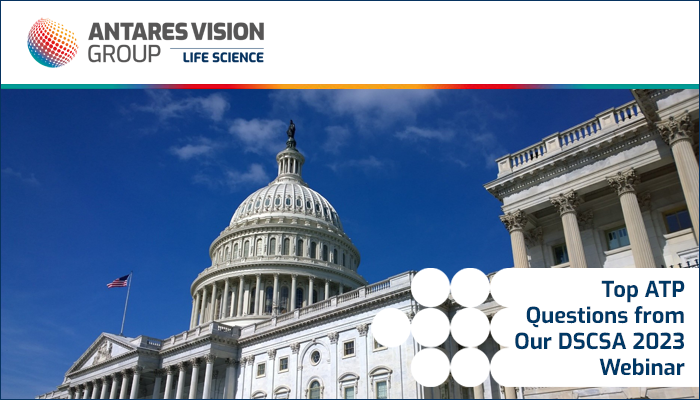Navigating complicated pharmaceutical regulations like the Drug Supply Chain Security Act (DSCSA) can be daunting. However, the DSCSA is crucial for ensuring the safety of the drugs that patients depend on — and compliance isn’t an option.
Introduced to prevent counterfeit, stolen, or contaminated prescription drugs from entering the supply chain, the DSCSA is enforced by the Food and Drug Administration (FDA) and provides regulations for manufacturers, wholesale distributors, dispensers, repackagers, and third-party logistics providers (3PLs).
In addition to product labeling and traceability standards, the DSCSA created a framework for credentialing and identifying authorized trading partners (ATPs). This allows supply chain actors to ensure that they are working only with verified and compliant companies. Here is everything you need to know about DSCSA ATPs.
Who Are Authorized Trading Partners Under DSCSA?
DSCSA authorized trading partners (ATPs) include manufacturers, wholesale distributors, dispensers, repackagers, and 3PLs. To be an ATP, companies must meet DSCSA compliance requirements and obtain a valid license to participate in the pharmaceutical supply chain.
Every member of the supply chain has a responsibility to maintain drug traceability records, thereby promoting public health interests under the DSCSA. These entities are charged with working together to identify illegitimate/suspect products, gather and store product tracing information, and adhere to FDA reporting requirements.
What Are the DSCSA Requirements for Authorized Trading Partners?
The foundational idea of the DSCSA is electronic interoperability among trading partners. Broadly, interoperability means that manufacturers, wholesale distributors, dispensers, repackagers, 3PLs, and other supply chain members can exchange mandated Transaction Information (TI) and Transaction Statements (TS) every time a drug changes hands. And they must do so in a secure, electronic, and interoperable manner. For DSCSA, this means using Electronic Product Code Information Services (EPCIS), a global GS1 Standard for creating and sharing visibility event data.
Required product data includes Product Identifiers (PIs) serial numbers, expiration dates, and lot and batch codes.
For more information regarding DSCSA requirements for ATPs, explore our DSCSA Compliance Library.
How Does DSCSA Define “Trading Partner”?
Pharmaceutical supply chain members are considered to be trading partners if they are involved in the exchange, purchase, or sale of drug products and biologics. It’s essential to distinguish between being a “trading partner” and an authorized trading partner.
The latter has met DSCSA requirements by obtaining proper licensure. If necessary, they have also registered with the appropriate state board of pharmacy.
What Are the Benefits of Being an Authorized Trading Partner?
Becoming an authorized trading partner isn’t just about ticking regulatory boxes. There are also tangible benefits for your business, your trading partners (who must also be ATPs, of course), and your patients and customers. These benefits include:
- Better patient safety: Ensuring that only genuine drugs reach patients promotes safety and benefits public health
- Improved product integrity: The DSCSA traceability requirements promote drug distribution security and supply chain integrity
- A competitive advantage: Complying with DSCSA regulations means you’ll have full access to the U.S. pharma supply chain and can even help your brand reputation
Additionally, complying with DSCSA requirements means you’ll avoid penalties, including fines. In turn, this will lead to enhanced trust with consumers and trading partners.
How Can Companies Verify Their Partner’s ATP Status?
Before engaging with any partner, always verify their ATP status. This isn’t an option; it’s a requirement.. To verify a trading partner, simply:
- Verify their licensing status with their respective state board
- Ensure they have the appropriate permits
- Retain copies of their licenses and permits for your records
Retaining copies of a trading partner’s license and permits proves that they were properly authorized at the time of your transaction.
The Role of ATPs in Pharmaceutical Traceability
Authorized trading partners play a pivotal role in pharmaceutical traceability. At every node of the supply chain, products could be damaged, tainted, or otherwise altered. However, when each entity does its part, you can ensure that the drug’s journey, from manufacturer to the patient, is transparent and verifiable.
Final Thoughts: DSCSA Authorized Trading Partners (ATPs)
In August 2023, the FDA postponed the enforcement of key DSCSA requirements to November 27, 2024. While this “stabilization period” gives DSCSA trading partners some breathing room, all pharmaceutical supply chain members must still be ATPs. Therefore, DSCSA ATPs should not view the extra time as a grace period to proceed with business as usual. Instead, they should continue getting their houses in order. As the FDA said, it “strongly urges trading partners to continue their efforts to implement necessary measures to satisfy these enhanced drug distribution security requirements.”
So what should you be doing? First, ensure that your current trading partners are also continuing their work for DSCSA compliance, including achieving ATP status. Additionally, you should explore technology upgrades that will help you comply with forthcoming DSCSA requirements.
To learn more about how you can prepare, connect with rfxcel. Our No. 1 priority is to help you understand the DSCSA regulations and be prepared to fully comply with the law.





